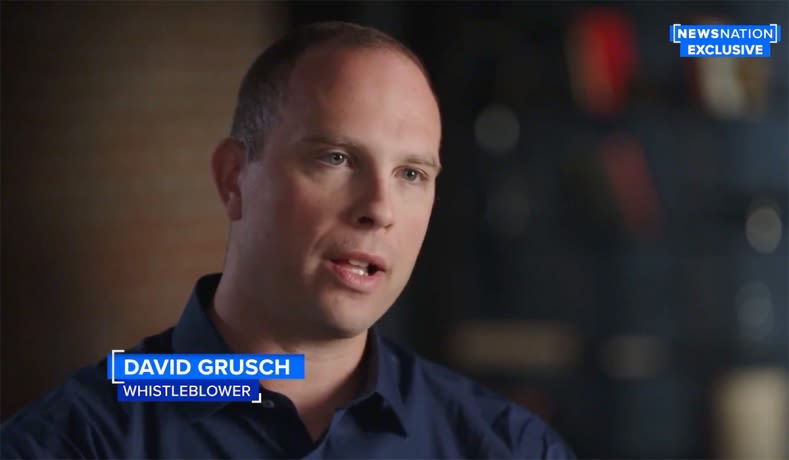Character Assassination: Inside the Coordinated Attack on UFO Whistleblower David Grusch
- Cristina Gomez

- Jun 4, 2025
- 4 min read
Updated: Jul 25, 2025
UFO whistleblower David Grusch’s $2.5 million privacy lawsuit against Loudoun County Sheriff’s Office has evolved into a landmark case testing the boundaries of government retaliation against inconvenient witnesses. The sophisticated character assassination campaign launched against him just days after his explosive congressional testimony reveals how modern intelligence agencies weaponize personal vulnerabilities to destroy credibility while maintaining plausible deniability.
The timeline of events following Grusch’s July 26, 2023 congressional testimony reads like a masterclass in coordinated character destruction. Within just 96 hours of his sworn testimony about secret government UFO crash retrieval programs, journalist Ken Klippenstein filed a Virginia Freedom of Information Act request targeting Grusch’s law enforcement records. Klippenstein later admitted receiving “vague tips” from multiple intelligence community sources described as “intel people” and “rank and file” operatives who specifically directed him to “look into Grusch’s background” and focus on police records. The surgical precision of this timing suggests a coordinated response designed to undermine the whistleblower’s credibility immediately after he delivered testimony that embarrassed Pentagon officials and challenged decades of government secrecy.

Two weeks later, on August 9th, The Intercept published devastating details of Grusch’s October 2018 mental health crisis, including his wife’s 911 call reporting him as drunk and suicidal, specific quotes from involuntary psychiatric commitment proceedings, and his ongoing struggles with PTSD and depression stemming from his Afghanistan military service. The article included particularly damaging personal details, such as Grusch allegedly telling his wife “I’ve just been waiting for you to kill me” when she suggested he seek help for alcoholism. This wasn’t random investigative journalism — it was a targeted strike designed to transform a decorated intelligence officer with impeccable credentials into a damaged veteran with mental health issues, fundamentally shifting public perception of his reliability as a witness.

The legal foundation of Grusch’s case rests on Virginia Code Section 37.2–818, which explicitly requires involuntary detention records to remain confidential and specifically exempts them from Freedom of Information Act disclosure. This statute contains crystal clear language protecting “recordings, relevant medical records, reports, and court documents pertaining to hearings” related to temporary detention, making the publication of these details a potentially clear-cut violation of state law. Grusch’s legal team, led by former Intelligence Community Inspector General Charles McCullough III, argues this disclosure violated both state privacy tort law and constitutional privacy rights, with legal experts calling the case exceptionally strong given Virginia’s robust history of protecting medical privacy through precedents like Fairfax Hospital v. Curtis, which established healthcare providers’ duty not to disclose treatment information and created tort liability for violations.

However, Loudoun County Sheriff’s Office isn’t conceding defeat and their defense strategy reveals the typical playbook government agencies use to escape privacy violation accountability. They’ve filed a Plea in Bar motion attempting to get the case dismissed before trial, likely arguing they possessed legal immunity to release the records, that the information constituted regular law enforcement documents rather than protected medical information, or that Grusch waited too long to file the lawsuit under statute of limitations provisions. The crucial legal distinction between medical records versus law enforcement records becomes central to their defense, as police reports typically enjoy much weaker privacy protections than medical information, allowing the sheriff’s office to claim they were merely responding to a legitimate FOIA request rather than illegally releasing confidential medical details.
The procedural developments following the June 2nd, 2025 hearing demonstrate the case’s complexity and potential significance for future whistleblower protection. The judge postponed deciding on the Plea in Bar motion and scheduled an August 6th hearing to address a demurrer — another dismissal motion arguing that even if all of Grusch’s claims are true, he lacks a valid legal case. This careful judicial consideration rather than immediate dismissal suggests Grusch’s legal arguments have substantial merit, which should concern other government agencies potentially employing similar retaliation tactics against whistleblowers. The early procedural stage means the court is still determining whether the case can proceed to examine the actual facts of what happened, but the judge’s methodical approach indicates serious legal questions requiring resolution.

The broader implications of this case extend far beyond UFO disclosure or David Grusch’s personal situation, revealing the sophisticated evolution of government character assassination campaigns in the digital age. The coordination between intelligence community sources directing media attention to Grusch’s most vulnerable personal moments while maintaining plausible deniability through legitimate FOIA processes demonstrates how modern retaliation works — it’s not crude intimidation or obvious harassment, but surgical strikes using legal mechanisms and cooperative journalists to destroy credibility while keeping government hands technically clean. Intelligence agencies don’t directly leak sensitive information; instead, they guide reporters toward specific records requests, then observe while media outlets execute the character destruction, creating layers of separation that protect officials from direct accountability.
Why it Actually Matters
This sophisticated approach transforms traditional whistleblower retaliation from obvious persecution that might generate sympathy into seemingly legitimate journalism that appears to reveal character flaws undermining witness credibility. Whether Grusch’s UFO claims possess any validity becomes almost irrelevant when measured against the demonstration that even decorated intelligence officers with official whistleblower protections can have their most private medical struggles weaponized against them within days of providing inconvenient congressional testimony. If someone with Grusch’s credentials, preparation, and legal protections can be systematically destroyed through coordinated revelation of personal vulnerabilities, what realistic protection exists for other potential whistleblowers contemplating disclosure of sensitive national security information?
Grusch’s $2.5 million lawsuit represents more than financial compensation — it’s an attempt to establish legal precedent protecting future whistleblowers from similar character assassination campaigns that weaponize personal medical information for political purposes. The case’s outcome will likely determine whether other government insiders are willing to risk having their most private struggles become public ammunition for speaking truth to power, making this a defining moment for whistleblower protection in the modern surveillance state.















Comments